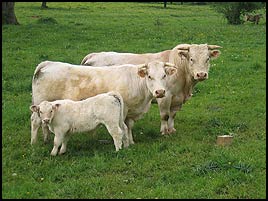Cow-talk
By Andrew Levy | Aug 20, 2007

They have one word in their vocabulary and it’s a single syllable at that.
But farmers claim cows appear to ‘moo’ in regional accents, despite their limited conversational skills.
Herds in the West Country (in England) have been heard lowing with a distinctive Somerset twang – prompting some to claim the sound is more ‘moo-arr’ than moo.
Brummie (Birmingham) accents have been noticed in the Midlands, while Geordie tones abound in Tyne and Wear and there are overtones of Estuary English around the South East.
A similar phenomenon has previously been noticed among wild birds, which twitter in different accents depending on what part of the country they are from.
The difference with the bovine version is that cattle are believed to be picking up their owners’ accents and may even be passing them on to their calves.
The regional twangs were first noticed by members of the West Country Farmhouse Cheesemakers group. Members spend hours with their herds making sure they are wearing cow coats and playing them classical music.
The practice is supposed to contribute towards the local cheddar’s distinctive flavour.
One of the group, Lloyd Green, from Glastonbury, Somerset, said: ‘I spend a lot of time with my Friesans (Holsteins) and they definitely moo with a Somerset drawl.
‘I’ve spoken to other farmers in the area and they have noticed a similar development in their own herds.
‘I think it works the same as with dogs – the closer a farmer’s bond is with his animals, the easier it is to pick up his accent.’
Academic approval
The claims might have dismissed as nonsense but for widespread academic approval yesterday.
John Wells, professor of phonetics at University College London, said: ‘This phenomenon is well attested in birds.
‘You find distinct chirping accents in the same species around the country. This could also be true of cows.
‘In small populations such as herds you would encounter dialectical variations which are most affected by the immediate peer group.’
Dr Jeanine Treffers-Daller, reader in linguistics at the University of West England, Greed cows could pick up accents from relatives.
‘When we are learning to speak we adopt a local variety of language spoken by our parents, so the same could be said about the variation in the West Country cow moo,’ she said.
The National Farmers’ Union (of England) also backed the claims.
Livestock expert Tom Hind said: ‘Cows will be used to hearing farmers shouting to bring them in with particular accents, depending on which part of the country they live in.
‘You could transport cows from one area of the country with a strong accent, such as Wales, to another and there could be a problem initially with them not responding to the new accent.’
A Forestry Commission-funded study in 1999 found that the penetrating call of nightjars – nocturnal birds that look similar to kestrels – vary in different parts of the country.
Dr Margaret Rebbeck, a lecturer in material science at the University of Bradford, who made hundreds of recordings for the survey, said at the time: ‘They learn from each other and from their parents – certain phrases get passed on.’
Not everyone was impressed by the theory, however.
Carl Padgett, honorary secretary of the British Cattle Veterinary Association, said: ‘I’d have thought variations were more about breed than region.
‘Cows also have a restricted vocabulary while birds have complicated communication structures, so it is highly likely their accents would change in different parts of the country.’
Source: The Daily Mail (London, England)















